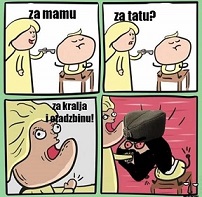Fetva protiv Rusa u svijetu
Page 1 of 3
Page 1 of 3 • 1, 2, 3 
 Fetva protiv Rusa u svijetu
Fetva protiv Rusa u svijetu
Ruska je vojska prvi put intervenirala nakon 1979. izvan granica bivšeg SSSR-a. Uključila se u sukobe u Siriji, no koji joj je cilj? Je li riječ samo o potpori savezniku Bašaru al-Asadu, čije svrgavanje s vlasti traži zapad, ili o djelatnom doprinosu borbe protiv tzv. Islamske države? Odgovore na ova pitanja pokušali smo dobiti u jutrošnjoj emisiji Hrvatskog radija "U mreži Prvog" u kojoj su gostovali politički analitičar Vlatko Cvrtila, vojni analitičar Marinko Ogorec te novinar Večernjeg lista Hassan Haidar Diab.
Rusija je iskoristila jalovost zapadne politke i nepostojanje rješenja za izbjegličku krizu, naglasio je Cvrtila.
Ogorec je rekao da su ruski udari na Siriju puno učinkovitiji od zapadnih.
Hassan Haidar Diab istaknuo je da umjerena oporba u Siriji na postoji. Sirija je podijeljena na pet dijelova. Jedan dio drži tzv. Islamska država, drugi dio režimske snage, a ostalo dijele različite ideološke frakcije. Haidar je istaknuo kako je porazna činjenica da je veliki broj intelektualaca i vjerskih vođa Saudijske Arabije pozvao na fetvu protiv Rusa u svijetu, rekao je Haidar.
http://www.hrt.hr/301808/vijesti/rusija-je-iskoristila-jalovost-zapadne-politke
Rusija je iskoristila jalovost zapadne politke i nepostojanje rješenja za izbjegličku krizu, naglasio je Cvrtila.
Ogorec je rekao da su ruski udari na Siriju puno učinkovitiji od zapadnih.
Hassan Haidar Diab istaknuo je da umjerena oporba u Siriji na postoji. Sirija je podijeljena na pet dijelova. Jedan dio drži tzv. Islamska država, drugi dio režimske snage, a ostalo dijele različite ideološke frakcije. Haidar je istaknuo kako je porazna činjenica da je veliki broj intelektualaca i vjerskih vođa Saudijske Arabije pozvao na fetvu protiv Rusa u svijetu, rekao je Haidar.
http://www.hrt.hr/301808/vijesti/rusija-je-iskoristila-jalovost-zapadne-politke

Guest- Guest
 Re: Fetva protiv Rusa u svijetu
Re: Fetva protiv Rusa u svijetu
Bojkot Rusije i Kine - sadržaj ove fetve:
http://israelmatzav.blogspot.co.at/2012/02/breaking-qaradawi-issues-fatwa-against.html
http://israelmatzav.blogspot.co.at/2012/02/breaking-qaradawi-issues-fatwa-against.html

Guest- Guest
 Re: Fetva protiv Rusa u svijetu
Re: Fetva protiv Rusa u svijetu
"Fetva ('فتوى) je pravna odluka odnosno zakonska izjava..."
-------------------------------
Donijeli su zakon protiv Rusa?
-------------------------------
Donijeli su zakon protiv Rusa?

crvenkasti-

Posts : 29707
2014-04-17
 Re: Fetva protiv Rusa u svijetu
Re: Fetva protiv Rusa u svijetu
crvenkasti wrote:"Fetva ('فتوى) je pravna odluka odnosno zakonska izjava..."
-------------------------------
Donijeli su zakon protiv Rusa?
Čitaj. Odluka, pravna, šerijat ... ide?

Guest- Guest
 Re: Fetva protiv Rusa u svijetu
Re: Fetva protiv Rusa u svijetu
Owi Saudijći baš oće da ih Ruje izrokaju.

RayMabus- Posts : 184105
2014-04-11
 Re: Fetva protiv Rusa u svijetu
Re: Fetva protiv Rusa u svijetu
I šta se desi onome protiv koga imaju fetvu?

crvenkasti-

Posts : 29707
2014-04-17
 Re: Fetva protiv Rusa u svijetu
Re: Fetva protiv Rusa u svijetu
E, znam. Slobodno mu odrežeš glavu?

crvenkasti-

Posts : 29707
2014-04-17
 Re: Fetva protiv Rusa u svijetu
Re: Fetva protiv Rusa u svijetu
Iran kupuje od Rusije putničke zrakoplove u iznosu od čak 21 milijardu USD
Dobit će oni tamo blokadu hormuškog tijesnaća sa Rusima u pozadini pa će piwat drugu pjesmiću.
Dobit će oni tamo blokadu hormuškog tijesnaća sa Rusima u pozadini pa će piwat drugu pjesmiću.

RayMabus- Posts : 184105
2014-04-11
 Re: Fetva protiv Rusa u svijetu
Re: Fetva protiv Rusa u svijetu
Ima odma da skoči ćijena nafte i ožiwi ruska ekonomija.

RayMabus- Posts : 184105
2014-04-11
 Re: Fetva protiv Rusa u svijetu
Re: Fetva protiv Rusa u svijetu
Russia bombing in Syria escalates oil price war with Saudi Arabia
Vladimir Putin’s order to begin bombing targets in Syria has left many political pundits in Washington and London wondering exactly what Russia’s ultimate strategic goal is in the Middle East.
Aside from propping up Bashar al-Assad’s regime, the presence in Syria of Russian bombers flying missions against opposition targets marks the biggest deployment of Moscow’s forces in the region since the Soviet intervention in Afghanistan.
Then, as now, oil had a big part to play in the Kremlin’s decision to strike. In 1979, as Russian tanks rolled into Kabul, oil was approaching $110 per barrel and the Islamic revolution in Iran weakened the West’s grip on the dynamics of supply and demand.
High oil prices emboldened the Soviet leadership and helped the creaking Communist government to finance its Cold War against the West in addition to feeding its population at home. Then, as now, oil exports were vital for Moscow’s coffers, accounting for almost 70pc of the country’s foreign currency earnings.
By placing boots on the ground in Afghanistan the Soviet Union also threatened the West’s vital energy corridor in the Gulf and the host of oil-rich US client states among the region’s newly independent sheikdoms.
The Soviets hoped that their military presence in the region would keep oil prices high enough for the country to win the Cold War by causing economic pain for the major industrialised consumer states in the West.
However, the strategy failed, with the collapse in oil prices in the following decade bankrupting the Kremlin and forcing Mikhail Gorbachev to launch the “Perestroika” reforms that eventually saw the collapse of the old Soviet state.
Putin – who, as the former head of the KGB, is a product of the Cold War – is today faced with the same dilemma as his Soviet forebears. The collapse in oil prices, which has been engineered by America’s major allies in the region – Saudi Arabia, the United Arab Emirates, Qatar and Kuwait – is crippling the Russian economy.
Russia is now in recession for the first time since 2009 and, as was the case during the Cold War, oil remains the country’s biggest single source of export income. The rouble has depreciated by about 43pc against the US dollar over the last 12 months and consumer price inflation hit a 13-year high earlier this year.
Should oil prices continue to average below $50 per barrel for the next year it is likely that even the long-suffering Russian people will begin to question Mr Putin’s leadership, which placed the country on a collision course with the US.
With oil markets oversupplied by at least 2m barrels per day (bpd) and neither Russia nor Saudi Arabia willing to cut back on production, Mr Putin’s intervention in Syria is an attempt to turn the tables on the American-led strategy to bankrupt Moscow.

The sight of Russian bombers in Syria alongside the deployment of around 500 troops in the port city of Latakia has so far had only a modest impact on oil prices. But that could change dramatically for three big reasons.
First, it will raise the stakes with Saudi Arabia and its Gulf allies, which are financing opposition in Syria fighting both the Assad regime and Islamic State. Riyadh has already been forced to withdraw an estimated $73bn in foreign assets to shore up its economy and is also having to fund an increasingly entrenched war against Iranian-backed rebels on its southern borders in Yemen.
Like Russia, the Saudi Arabian regime is under severe economic pressure from lower oil prices. The ruling House of Saud, led by the newly enthroned King Salman, is being openly criticised by princelings among its own numbers. The controversial strategy of pumping at record levels close to 10.5m bpd, despite weakening demand fundamentals, is threatening to break the Saudi royal family apart.

Faced with the choice of risking the dynasty’s survival by maintaining its proxy oil price war, or cutting output to force up the cost of a barrel, the Saudi regime is more likely to back down.
Secondly, Russia’s physical presence adds to tensions already reaching boiling point in a region that provides about a fifth of the world’s oil supply and a sizeable portion of its natural gas. Although political risk is currently not reflected in oil prices hovering below $50 per barrel, this could now change as Mr Putin seeks to establish a strategic foothold in the region.
Finally, Russia has strengthened the hand of Saudi Arabia’s arch enemies, Iran. Although the Iranians have secured a deal to lift economic sanctions in return for curtailing their nuclear programme, a final resolution hangs in the balance.
Iran is being hit by low oil prices and sanctions , which prevent it from maximising its income from its vast riches in resources.
The Iranians want to boost oil output by 1m bpd but are being outmanoeuvred by Saudi Arabia’s vice-like grip over the Organization of the Petroleum Exporting Countries (Opec).
With Russia appearing to back Iran’s allies in Syria, the regime in Tehran may feel emboldened to test Saudi Arabia’s resolve more forcibly when Opec next meets in December.
Of course, Russia’s direct intervention in Syria could result in all sides involved in the global oil price war digging in deeper and persisting with their current policies of driving the cost of a barrel even lower. The outcome of such a battle of attrition lasting for another 12 months could be the collapse of the governments in Riyadh and Moscow.
In either case, higher oil prices would quickly follow.
http://www.telegraph.co.uk/finance/commodities/11911194/Russia-bombing-in-Syria-escalates-oil-price-war-with-Saudi.html
Vladimir Putin’s order to begin bombing targets in Syria has left many political pundits in Washington and London wondering exactly what Russia’s ultimate strategic goal is in the Middle East.
Aside from propping up Bashar al-Assad’s regime, the presence in Syria of Russian bombers flying missions against opposition targets marks the biggest deployment of Moscow’s forces in the region since the Soviet intervention in Afghanistan.
Then, as now, oil had a big part to play in the Kremlin’s decision to strike. In 1979, as Russian tanks rolled into Kabul, oil was approaching $110 per barrel and the Islamic revolution in Iran weakened the West’s grip on the dynamics of supply and demand.
High oil prices emboldened the Soviet leadership and helped the creaking Communist government to finance its Cold War against the West in addition to feeding its population at home. Then, as now, oil exports were vital for Moscow’s coffers, accounting for almost 70pc of the country’s foreign currency earnings.
By placing boots on the ground in Afghanistan the Soviet Union also threatened the West’s vital energy corridor in the Gulf and the host of oil-rich US client states among the region’s newly independent sheikdoms.
The Soviets hoped that their military presence in the region would keep oil prices high enough for the country to win the Cold War by causing economic pain for the major industrialised consumer states in the West.
However, the strategy failed, with the collapse in oil prices in the following decade bankrupting the Kremlin and forcing Mikhail Gorbachev to launch the “Perestroika” reforms that eventually saw the collapse of the old Soviet state.
Putin – who, as the former head of the KGB, is a product of the Cold War – is today faced with the same dilemma as his Soviet forebears. The collapse in oil prices, which has been engineered by America’s major allies in the region – Saudi Arabia, the United Arab Emirates, Qatar and Kuwait – is crippling the Russian economy.
Russia is now in recession for the first time since 2009 and, as was the case during the Cold War, oil remains the country’s biggest single source of export income. The rouble has depreciated by about 43pc against the US dollar over the last 12 months and consumer price inflation hit a 13-year high earlier this year.
Should oil prices continue to average below $50 per barrel for the next year it is likely that even the long-suffering Russian people will begin to question Mr Putin’s leadership, which placed the country on a collision course with the US.
With oil markets oversupplied by at least 2m barrels per day (bpd) and neither Russia nor Saudi Arabia willing to cut back on production, Mr Putin’s intervention in Syria is an attempt to turn the tables on the American-led strategy to bankrupt Moscow.

The sight of Russian bombers in Syria alongside the deployment of around 500 troops in the port city of Latakia has so far had only a modest impact on oil prices. But that could change dramatically for three big reasons.
First, it will raise the stakes with Saudi Arabia and its Gulf allies, which are financing opposition in Syria fighting both the Assad regime and Islamic State. Riyadh has already been forced to withdraw an estimated $73bn in foreign assets to shore up its economy and is also having to fund an increasingly entrenched war against Iranian-backed rebels on its southern borders in Yemen.
Like Russia, the Saudi Arabian regime is under severe economic pressure from lower oil prices. The ruling House of Saud, led by the newly enthroned King Salman, is being openly criticised by princelings among its own numbers. The controversial strategy of pumping at record levels close to 10.5m bpd, despite weakening demand fundamentals, is threatening to break the Saudi royal family apart.

Faced with the choice of risking the dynasty’s survival by maintaining its proxy oil price war, or cutting output to force up the cost of a barrel, the Saudi regime is more likely to back down.
Secondly, Russia’s physical presence adds to tensions already reaching boiling point in a region that provides about a fifth of the world’s oil supply and a sizeable portion of its natural gas. Although political risk is currently not reflected in oil prices hovering below $50 per barrel, this could now change as Mr Putin seeks to establish a strategic foothold in the region.
Finally, Russia has strengthened the hand of Saudi Arabia’s arch enemies, Iran. Although the Iranians have secured a deal to lift economic sanctions in return for curtailing their nuclear programme, a final resolution hangs in the balance.
Iran is being hit by low oil prices and sanctions , which prevent it from maximising its income from its vast riches in resources.
The Iranians want to boost oil output by 1m bpd but are being outmanoeuvred by Saudi Arabia’s vice-like grip over the Organization of the Petroleum Exporting Countries (Opec).
With Russia appearing to back Iran’s allies in Syria, the regime in Tehran may feel emboldened to test Saudi Arabia’s resolve more forcibly when Opec next meets in December.
Of course, Russia’s direct intervention in Syria could result in all sides involved in the global oil price war digging in deeper and persisting with their current policies of driving the cost of a barrel even lower. The outcome of such a battle of attrition lasting for another 12 months could be the collapse of the governments in Riyadh and Moscow.
In either case, higher oil prices would quickly follow.
http://www.telegraph.co.uk/finance/commodities/11911194/Russia-bombing-in-Syria-escalates-oil-price-war-with-Saudi.html

Guest- Guest
 Re: Fetva protiv Rusa u svijetu
Re: Fetva protiv Rusa u svijetu
Oj sipt...saudijciii crni, vraniii...crni su vam dosli daaaaniiiiLe Roi Soleil wrote:Russia bombing in Syria escalates oil price war with Saudi Arabia
Vladimir Putin’s order to begin bombing targets in Syria has left many political pundits in Washington and London wondering exactly what Russia’s ultimate strategic goal is in the Middle East.
Aside from propping up Bashar al-Assad’s regime, the presence in Syria of Russian bombers flying missions against opposition targets marks the biggest deployment of Moscow’s forces in the region since the Soviet intervention in Afghanistan.
Then, as now, oil had a big part to play in the Kremlin’s decision to strike. In 1979, as Russian tanks rolled into Kabul, oil was approaching $110 per barrel and the Islamic revolution in Iran weakened the West’s grip on the dynamics of supply and demand.
High oil prices emboldened the Soviet leadership and helped the creaking Communist government to finance its Cold War against the West in addition to feeding its population at home. Then, as now, oil exports were vital for Moscow’s coffers, accounting for almost 70pc of the country’s foreign currency earnings.
By placing boots on the ground in Afghanistan the Soviet Union also threatened the West’s vital energy corridor in the Gulf and the host of oil-rich US client states among the region’s newly independent sheikdoms.
The Soviets hoped that their military presence in the region would keep oil prices high enough for the country to win the Cold War by causing economic pain for the major industrialised consumer states in the West.
However, the strategy failed, with the collapse in oil prices in the following decade bankrupting the Kremlin and forcing Mikhail Gorbachev to launch the “Perestroika” reforms that eventually saw the collapse of the old Soviet state.
Putin – who, as the former head of the KGB, is a product of the Cold War – is today faced with the same dilemma as his Soviet forebears. The collapse in oil prices, which has been engineered by America’s major allies in the region – Saudi Arabia, the United Arab Emirates, Qatar and Kuwait – is crippling the Russian economy.
Russia is now in recession for the first time since 2009 and, as was the case during the Cold War, oil remains the country’s biggest single source of export income. The rouble has depreciated by about 43pc against the US dollar over the last 12 months and consumer price inflation hit a 13-year high earlier this year.
Should oil prices continue to average below $50 per barrel for the next year it is likely that even the long-suffering Russian people will begin to question Mr Putin’s leadership, which placed the country on a collision course with the US.
With oil markets oversupplied by at least 2m barrels per day (bpd) and neither Russia nor Saudi Arabia willing to cut back on production, Mr Putin’s intervention in Syria is an attempt to turn the tables on the American-led strategy to bankrupt Moscow.
The sight of Russian bombers in Syria alongside the deployment of around 500 troops in the port city of Latakia has so far had only a modest impact on oil prices. But that could change dramatically for three big reasons.
First, it will raise the stakes with Saudi Arabia and its Gulf allies, which are financing opposition in Syria fighting both the Assad regime and Islamic State. Riyadh has already been forced to withdraw an estimated $73bn in foreign assets to shore up its economy and is also having to fund an increasingly entrenched war against Iranian-backed rebels on its southern borders in Yemen.
Like Russia, the Saudi Arabian regime is under severe economic pressure from lower oil prices. The ruling House of Saud, led by the newly enthroned King Salman, is being openly criticised by princelings among its own numbers. The controversial strategy of pumping at record levels close to 10.5m bpd, despite weakening demand fundamentals, is threatening to break the Saudi royal family apart.
Faced with the choice of risking the dynasty’s survival by maintaining its proxy oil price war, or cutting output to force up the cost of a barrel, the Saudi regime is more likely to back down.
Secondly, Russia’s physical presence adds to tensions already reaching boiling point in a region that provides about a fifth of the world’s oil supply and a sizeable portion of its natural gas. Although political risk is currently not reflected in oil prices hovering below $50 per barrel, this could now change as Mr Putin seeks to establish a strategic foothold in the region.
Finally, Russia has strengthened the hand of Saudi Arabia’s arch enemies, Iran. Although the Iranians have secured a deal to lift economic sanctions in return for curtailing their nuclear programme, a final resolution hangs in the balance.
Iran is being hit by low oil prices and sanctions , which prevent it from maximising its income from its vast riches in resources.
The Iranians want to boost oil output by 1m bpd but are being outmanoeuvred by Saudi Arabia’s vice-like grip over the Organization of the Petroleum Exporting Countries (Opec).
With Russia appearing to back Iran’s allies in Syria, the regime in Tehran may feel emboldened to test Saudi Arabia’s resolve more forcibly when Opec next meets in December.
Of course, Russia’s direct intervention in Syria could result in all sides involved in the global oil price war digging in deeper and persisting with their current policies of driving the cost of a barrel even lower. The outcome of such a battle of attrition lasting for another 12 months could be the collapse of the governments in Riyadh and Moscow.
In either case, higher oil prices would quickly follow.
http://www.telegraph.co.uk/finance/commodities/11911194/Russia-bombing-in-Syria-escalates-oil-price-war-with-Saudi.html

_________________


Stanojko- Posts : 8340
2014-05-05
 Re: Fetva protiv Rusa u svijetu
Re: Fetva protiv Rusa u svijetu
Sad bi lijepo trebalo da neki ruski ratni brod ode do Irana prođe Hormuški tijesnac i ostane malo u perziskom zaljewu .......a malo i zajedničke wojne wježbe sa iranskom ratnom mornarićom nebi bile na odmet.

RayMabus- Posts : 184105
2014-04-11
 Re: Fetva protiv Rusa u svijetu
Re: Fetva protiv Rusa u svijetu
Zapovjednik iranske mornarice, admiral Habibollah Sayyari, rekao je u razgovoru za medije kako će Iran i Rusija u idućih nekoliko mjeseci održati zajedničke vojne vježbe.
"Održati ćemo zajedničke vježbe s ruskom mornaricom. Nedavno smo imali zajedničke vježbe s indijskim i ruskim brodovima na prostoru naših teritorijalnih voda", rekao je Sayyari u razgovoru za iransku državnu novinsku agenciju ISNA.
Također je istaknuo kako će brodovi iranske mornarice posjetiti Rusiju u idućih nekoliko mjeseci.
Po pitanju održavanja ovih zajedničkih pomorskih vojnih vježbi za sada još uvijek nema službene potvrde od strane ruskog ministarstva obrane.
http://www.advance.hr/vijesti/iran-najavio-kako-ce-uskoro-odrzati-zajednicke-vojne-vjezbe-s-ruskom-mornaricom/
"Održati ćemo zajedničke vježbe s ruskom mornaricom. Nedavno smo imali zajedničke vježbe s indijskim i ruskim brodovima na prostoru naših teritorijalnih voda", rekao je Sayyari u razgovoru za iransku državnu novinsku agenciju ISNA.
Također je istaknuo kako će brodovi iranske mornarice posjetiti Rusiju u idućih nekoliko mjeseci.
Po pitanju održavanja ovih zajedničkih pomorskih vojnih vježbi za sada još uvijek nema službene potvrde od strane ruskog ministarstva obrane.
http://www.advance.hr/vijesti/iran-najavio-kako-ce-uskoro-odrzati-zajednicke-vojne-vjezbe-s-ruskom-mornaricom/

RayMabus- Posts : 184105
2014-04-11
 Re: Fetva protiv Rusa u svijetu
Re: Fetva protiv Rusa u svijetu
Znači Feta, zanimljivo nema fetwe protiv "koalicije" hahaha to je odlična vijest sa druge strane jer izgleda Rus udara udara u kosku...

Kermit-

Posts : 26479
2014-04-17
 Re: Fetva protiv Rusa u svijetu
Re: Fetva protiv Rusa u svijetu
RayMabus wrote:Sad bi lijepo trebalo da neki ruski ratni brod ode do Irana prođe Hormuški tijesnac i ostane malo u perziskom zaljewu .......a malo i zajedničke wojne wježbe sa iranskom ratnom mornarićom nebi bile na odmet.
Za sada je dovoljna owa podmornica.

Uz pratnju - desantni brodovi Nikolaj Filičenkov, Aleksandr Šabalin, Admiral Nevelski i Peresvet,
zatim razarač Nastojčivij, korveta Štil, raketna topovnjača Ivanovec, raketna krstarica Moskva
te fregate Smetljivij i Neustrašimij.
Tu je i izviđački brodPriazovje praćen desantnim brodovima Minsk i Novočerkassk.

Yehudi- Posts : 14715
2014-04-20
 Re: Fetva protiv Rusa u svijetu
Re: Fetva protiv Rusa u svijetu
Kremlj ozbiljno razmišlja o pomorskoj blokadi sirijske obale kako bi se spriječio dotok oružja pripadnicima tzv. Islamske države, ali i izveli napadi na islamističke položaje s brodova, izjavio je predsjednik parlamentarnog Odbora za obranu i bivši zapovjednik ruske crnomorske flote Vladimir Komojedov
POMORSKA BLOKADA
Rusi blokiraju sirijsku obalu, Kinezi će tući ISIL s nosača aviona
Yehudi- Posts : 14715
2014-04-20
Page 1 of 3 • 1, 2, 3 
 Similar topics
Similar topics» Višnja Starešina za Oluju protiv Rusa
» Poljaci se ujedinjuju s Arapima protiv Rusa i Nijemaca
» Nizozemska podigla optužnice protiv Rusa zbog obaranja MH17
» Nije istina da Srbi nikad nisu ratovali protiv Rusa
» Francuska vraća ambasadora u Washington u zamjenu za američku pomoć protiv Rusa u Maliju
» Poljaci se ujedinjuju s Arapima protiv Rusa i Nijemaca
» Nizozemska podigla optužnice protiv Rusa zbog obaranja MH17
» Nije istina da Srbi nikad nisu ratovali protiv Rusa
» Francuska vraća ambasadora u Washington u zamjenu za američku pomoć protiv Rusa u Maliju
Page 1 of 3
Permissions in this forum:
You cannot reply to topics in this forum
 Events
Events Latest images
Latest images
 by Guest 5/10/2015, 14:09
by Guest 5/10/2015, 14:09